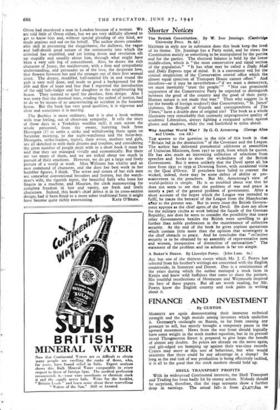Shorter Notices
NEITHER in style nor in substance does this book keep the level of its theme. Dr. Jennings has a Party mind, and he views the Constitution mainly as something to be manipulated by the parties and for the parties. The electoral balance is held by the lower middle-class, which is " the most conservative and timid section of the population." " It has what may be called a Daily Mail and Daily Express type of mind. It is a convenient veil for the cynical empiricism of the Conservative central office which the almost equal cynicism of Transport House cannot offset." And therefore—or it may be nevertheless—" if we want a democracy, we must inevitably ' trust the people.'" " Nor can prominent supporters of the Conservative Party be expected to distinguish between the good of the country and the good of their party. Human nature is not made that way." Then why suggest (is it for the benefit of foreign readers?) that Conservatives, " St. James' clubmen, the Brigade of Guards and correspondents of The Times," have a double dose of original sin? The book as a whole illustrates very remarkably that curiously unprogressive quality of academic Liberalism, always fighting a rearguard action against ghosts and shadows, while the real battlefield is miles ahead.






















 Previous page
Previous page